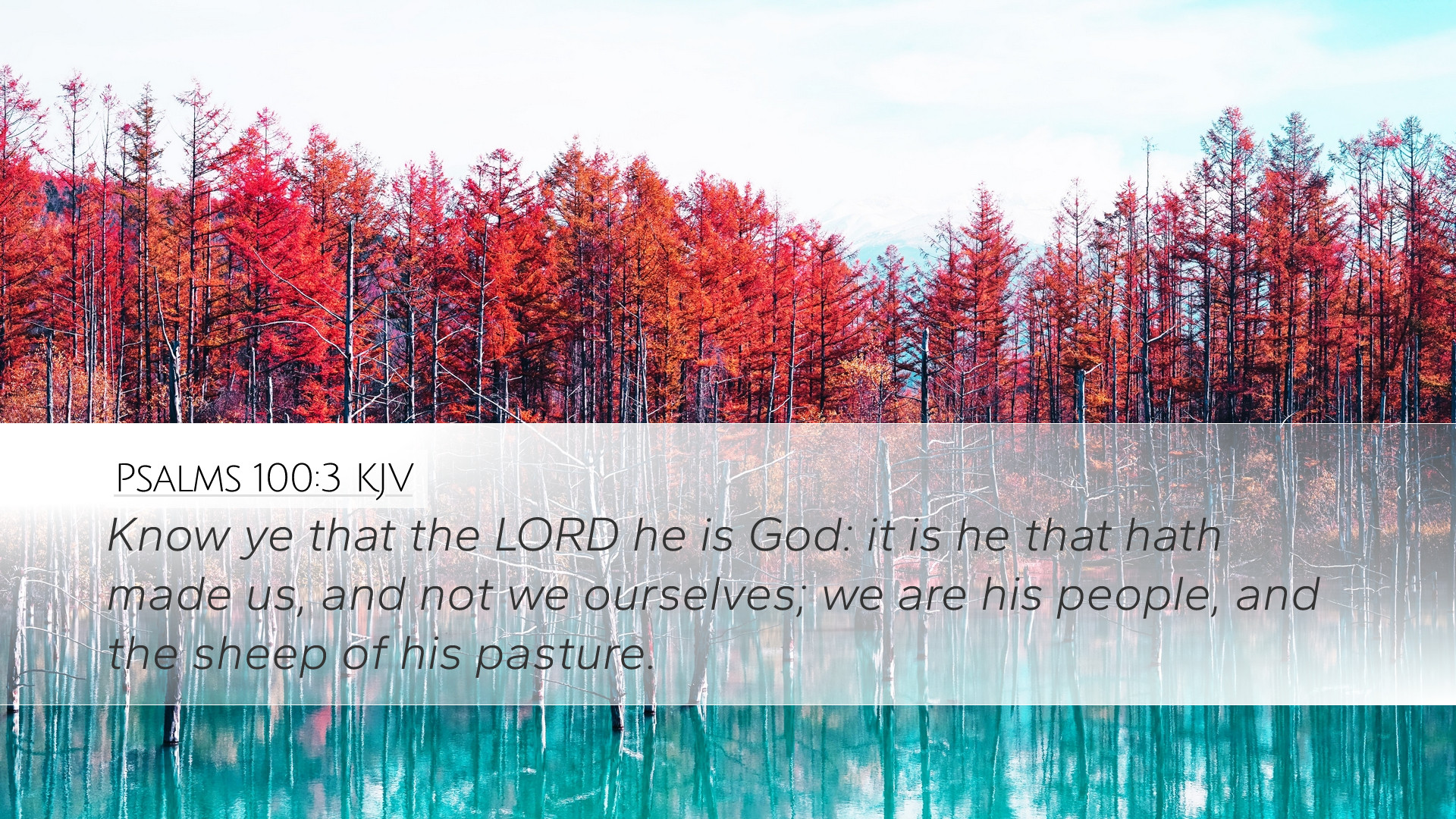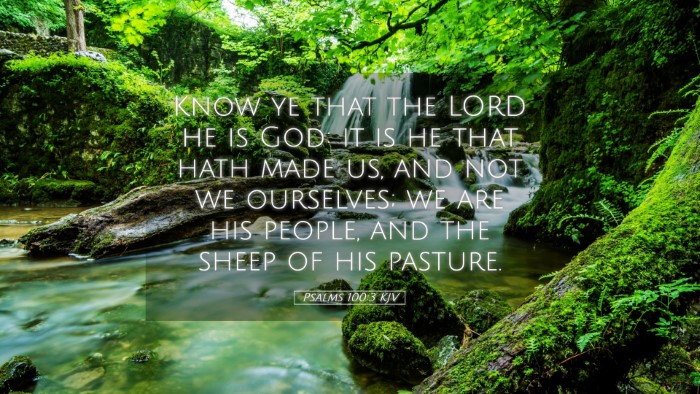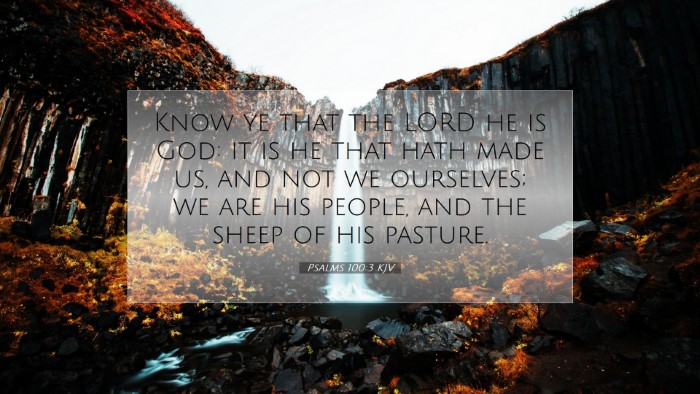Psalms 100:3 Commentary
Verse Text: "Know that the Lord, He is God; It is He who has made us, and not we ourselves; We are His people and the sheep of His pasture."
Introduction
This verse from Psalms 100:3 serves as both a proclamation and an invitation to recognize the sovereignty and care of God over His creation. It establishes a foundational truth about the nature of humanity’s relationship with the Creator. The insights from esteemed commentators such as Matthew Henry, Albert Barnes, and Adam Clarke shed light on the rich theological implications embedded within these words.
The Nature of God
Matthew Henry's Insight: Henry emphasizes the importance of knowing the Lord as God. This knowledge goes beyond mere intellectual assent; it calls for experiential acknowledgment of His attributes, particularly His sovereignty and creative power. When he writes, “He is God;” Henry asserts that this declaration is essential for true worship and understanding our place as His creation.
Albert Barnes' Perspective: Barnes elaborates that the phrase “the Lord, He is God” underscores the necessity to recognize God's unique position as the sole deity in the universe. In a world filled with competing claims to truth and divinity, this affirmation serves as a reminder of God's exclusive sovereignty. He argues that understanding God’s nature as Creator is crucial for developing a proper attitude in worship and service.
Adam Clarke's Commentary: Clarke emphasizes that acknowledging God as our Creator involves recognizing both His power and care. He details how the Lord's creative acts introduce both purpose and design into our existence. Clarke points out that by understanding that "He has made us," believers are encouraged to appreciate their inherent value as part of God's creation.
Understanding Our Identity
The phrase “It is He who has made us, and not we ourselves” reinforces the fundamental doctrine of creation and implies our dependence on God. Each commentator provides a unique lens through which to view this truth.
Matthew Henry: Henry shares that acknowledging our creation by God leads to humility. Recognizing that we had no role in our existence promotes a spirit that is not self-sufficient, but one that relies on and reveres our Creator. It also highlights our identity as crafted beings that glorify the One who made us.
Albert Barnes: Barnes emphasizes that this declaration connects believers with their identity as part of God’s flock. He notes that such a relationship brings security and purpose, as God not only created us but desires to shepherd us through life. Understanding our identity as “His people” directly leads to a stronger faith and reliance on His promises.
Adam Clarke: Clarke stresses that our existence is a divine intention. He captures the essence of human dignity in this acknowledgement, suggesting that being made in God's image carries with it immense value. Moreover, Clarke indicates that this identity shapes our interaction both with God and with others, urging believers to live out their identities as reflections of their Creator.
The Relationship and Care of God
The conclusion of the verse, “We are His people and the sheep of His pasture,” highlights the tender and protective nature of God towards humanity. Each commentator articulates the implications of this relationship.
Matthew Henry: Henry points out that the metaphor of “sheep” portrays humanity as vulnerable and in need of guidance. He argues that this relationship implies God’s active role as our Shepherd, providing direction, care, and protection for His flock. The concept of ‘pasture’ represents abundance and sustenance provided by God, signifying not only physical needs but spiritual nourishment.
Albert Barnes: Barnes reflects on the responsibilities that come with being identified as God’s people. He suggests that the acknowledgment of our relationship with God should inspire obedience, submission, and gratitude. Furthermore, Barnes connects this imagery to the practices of the community of faith, urging believers to live out their identity through love and service to one another, as they have been lovingly tended by their Shepherd.
Adam Clarke: Clarke elaborates on the significance of the covenant relationship portrayed in this verse. He expresses that being called “His people” suggests an intimate bond where God commits to care for His own. The incorporation of the sheep metaphor signifies trust and dependence, guiding believers toward a life of faithful following in the paths prepared by God.
Theological Implications and Application
In analyzing Psalms 100:3, several theological implications arise that are pertinent for pastors, students, and theologians alike.
- The Sovereignty of God: The affirmation of God's position as Creator and sustainer should cultivate a deeper trust in His divine will.
- The Nature of Humanity: Embracing our identity as created beings leads to humility and a deeper appreciation of our dependence on God.
- The Care of God: The recognition of God as our Shepherd encourages believers to rest in His provision while also prompting a response of obedience and service.
In practical terms, congregational leaders can leverage this understanding in teaching and pastoral care, ensuring that believers grasp their identity and role within the body of Christ. The assurance of God’s care and authority can be a source of encouragement throughout the trials of life.
Conclusion
Psalms 100:3 serves as a profound reminder of God’s sovereignty, our identity as His creation, and the close relationship we share with Him. Each commentator provides invaluable insights, illuminating the verse's depth and application for faithful living. As we internalize these truths, we can better appreciate our place in God’s divine narrative and embrace the call to live as His people, reflecting His glory in all we do.


